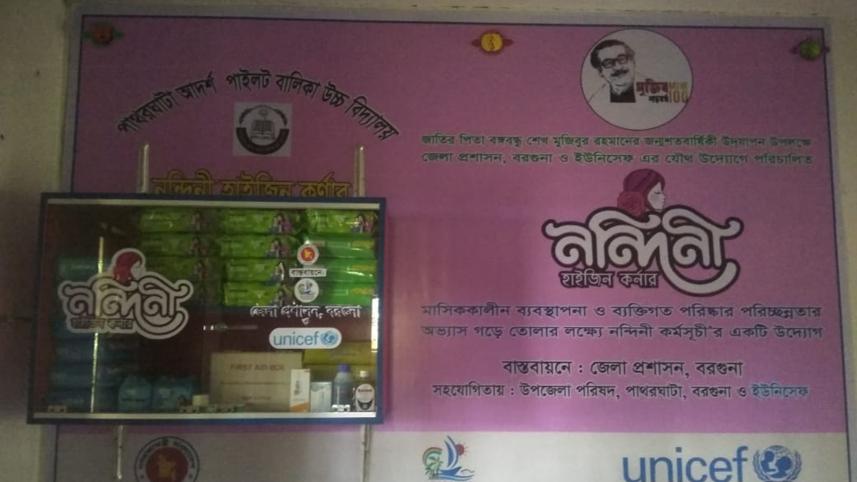Period no more a taboo in Barguna

When the topic of menstruation is still considered somewhat a taboo in the country, the district administration of Barguna has come forward with a bold move to ensure proper adolescent health practices among students in the district.
The administration under a programme is providing free sanitary napkins for female students in all 305 educational institutions including schools and madrasas in the district.
Under the programme styled 'Nandini Hygiene Corner', free sanitary napkins, first aid kit and iron pills are being kept in a glass case installed on the wall of a secure room at each educational institution. Each of the room is also provided with a covered trash bin to dispose of used napkins.
The administration, assisted by upazila parishads concerned and the UNICEF, took the initiative to ensure hygiene among schoolgirls who are found to be skipping school during their menstruating days.
In a survey titled 'Survey on Personal Menstrual Hygiene Management', conducted by the district administration, it was found that 81 percent of female students at secondary schools and 83 percent of them at madrasas use rags during their menstrual periods.
During the time, 84 percent of the girls at secondary schools and 86 percent of them at madrasas do not attend classes.
The survey was conducted from December, 2019 to January this year when 380 students and teachers in Barguna took part.
In 2014, a national survey titled 'Bangladesh National Hygiene Baseline Survey-2014' revealed that 86 percent of the country's girls use rags during menstruation and 40 percent of female students do not attend school during their menstruation.
The use of rags during menstruation is a cause for various infections among women, the study also mentioned.
Since August last year, as part of building awareness on menstrual hygiene among students and as a special initiative ahead of the Mujib Centenary celebrations, the Barguna district administration also started training students and teachers on adolescent health and hygiene issues.
Under the programme, a female student, a male student, a female teacher and the head teacher of each school are being trained on the issues.
So far, 1,220 students and teachers of different schools have received the training that is scheduled to be completed by this year. The trained students and teachers will later on disseminate information on proper adolescent health and hygiene practices among other students at their respective educational institutions.
Khaleda Akhter, an eighth grader at DKP Secondary School in Barguna Sadar upazila, said she and her female classmates used to stay home during their periods.
But now, thanks to free sanitary napkins provided by the district administration at a convenient location in the school, she no longer skips school during her periods.
This is a noble initiative that is also helping eradicate superstition and disinformation in the society, she added.
Mahfuzur Rahman, assistant commissioner in Barguna and coordinator of the programme, said various activities taken by the district administration have now created an open environment for dialogues. But before, even teachers were hesitant to talk about the topic of menstruation in their classrooms.
As many as 50 educational institutions have come under the ongoing training programme so far, he added.
Barguna Deputy Commissioner Mustain Billah said for a healthy and prosperous nation, proper health and personal hygiene practices have to be ensured among adolescents of today.
The Nandini Hygiene Programme is contributing to achieving various sustainable development goals (SDGs) including ensuring health services, gender equality and dissemination of quality education for all, he also said.

 For all latest news, follow The Daily Star's Google News channel.
For all latest news, follow The Daily Star's Google News channel.